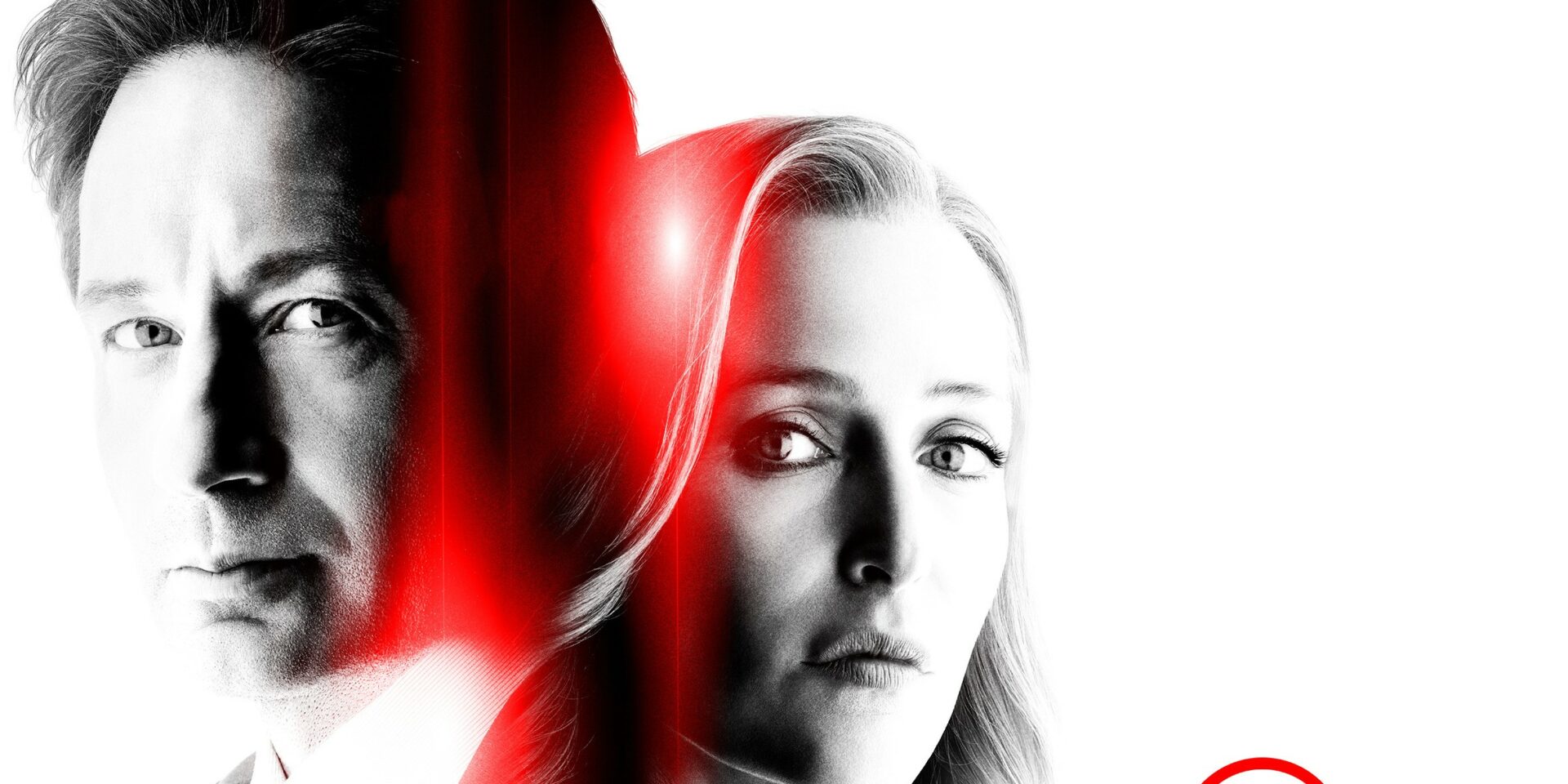The eleventh and final season of The X-Files is season 10 but more. The episode count is higher, ten instead of six, but also everything in that first revival season returns increased. What was good last season is better, and what was bad is somehow worse. The mythology episodes are even more disastrous but the solid standalone episodes sandwiched between the ongoing story are improved. Even the Darin Morgan episode is more… Darin Morgan-y.
The season begins terribly, and ends almost as badly, yet in the middle there’s some good stuff. And other than Darin Morgan, it’s the new writers and directors that deliver the best episodes. After a long and exhausting journey, The X-Files does reach its final resting place, but the irony is for the first time in a while there are sparks of life in the show when pulled from the cold grasp of creator Chris Carter and other legacy writers. Yet despite these hopeful twitches from the show’s corpse, I have huge respect for Gillian Anderson walking away from the show. This is the final season because she refused to do more, and I think she has the clearest sight on the series and its legacy than anyone else because of it.
Perhaps the most marked improvement over the previous season is that Mulder and Scully often feel more like their old selves, or rather old versions of their old selves. Duchovny and Anderson have gotten better at finding their characters again, slipping into them easier. When the two of them are together, bouncing off each other, it works. The natural chemistry returns and the show has some energy, rather than them slowly and morosely whispering at each other like in season 10. But often, especially in the mythology, the writing for them feels even worse. Duchovny and Anderson feel like their characters more often in spite of the writing than because of it. They hold what’s left of the show together, with no side characters being the least bit interesting. Despite one good episode, Skinner is trapped in a loop of being untrustworthy for no real reason and eleven seasons in it is infuriating.
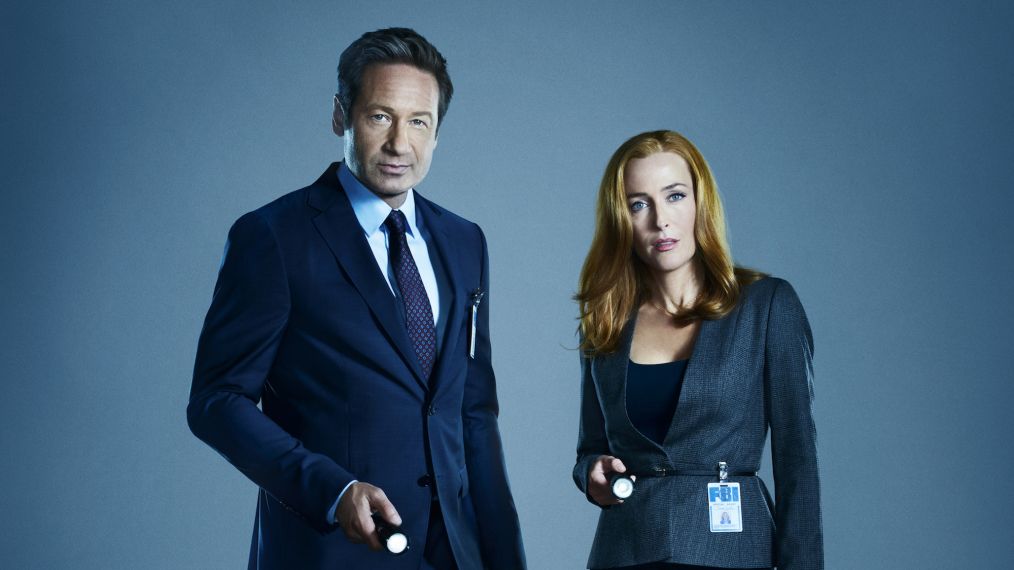
Not helping Mulder and Scully’s characterisation is the writers’ obsession with turning the two of them into action heroes. I don’t know whether it’s an intentional adjustment to the characters or if the writers had always pictured the agents as gun-toting, fist-fighting badasses and only now have the resources to show it. Either way, I really dislike it. There are cliché scenes like Scully pretending Mulder is a dangerous prisoner to sneak into a building before they shoot a bunch of people and Mulder straight-up commits murders in multiple episodes with no repercussions or even acknowledgement. I remember Mulder pointing a gun at the Cigarette-Smoking Man in season 2 feeling so significant and dramatic but now he approaches all conversations at gunpoint, even with Skinner. It’s become ludicrous.
Rather than further developing the existing virus storyline, or God forbid wrapping it up, the season sets out a new conspiracy. The CSM may be working alone but other forces in the government are setting out to colonise space. This could be an interesting idea, very much the opposite of the past mythology storyline which saw aliens attempt to colonise Earth. But it never moves beyond an idea. It never truly becomes a story, and Carter never offers a reason to care and become invested. There’s no threat. The new bad guys of Mr. Y and Ericka Price are bland and quickly killed in the finale, leaving not one but two huge conspiracies out in the ether with no conclusion. And it feels strange for The X-Files, a show so much about aliens, to have its final season have absolutely nothing to do with extraterrestrials. They’ve been irrelevant to the revival seasons; a key part of the show’s DNA missing.
Worst Mythology Episode: My Struggle III (S11E1)
My Struggle III baffles me. In terms of plot and characterisation but mainly in how it was allowed to be produced and aired on television. It’s is that bad; I’m not being hyperbolic. It’s laughably terrible and has to be the worst episode of scripted television I’ve ever seen. The season 10 finale promised the apocalypse the show has been teasing for decades, the virus unleashed, and the season 11 premiere makes the bold proclamation that it was all a dream. 95% of the previous episode is revealed simply to have happened in Scully’s head, a vision of a possible future. Chris Carter ignores the fact that Mulder went missing before the point of My Struggle II where the dream retroactively starts but this is the wrong episode to attach logic to. Was the vision true? Reyes is indeed a bad guy as Scully saw but the Smoking Man’s face isn’t messed up this episode, and this episode treats the alien DNA as a virus rather than the cure. The show can longer keep continuity with the previous episode, so forget the ten previous seasons. The implication that the aliens, who have been planning the takeover of earth for millennia, gave up because of global warming is ludicrous.

My Struggle III falls back on the old classic mythology episode setup: Scully in hospital, fighting for her life, while Mulder angrily marches around. Neither character sound like themselves in the episode, speaking in completely nonsensical sentences, and the atrocious dialogue prevents the actors from doing any good work. Mulder is in full action movie mode but the production is too poor execute it with any success. The episode features the worst car chase I’ve ever seen, composed mainly of greenscreen shots of the actors, close ups of speed gauges, and the few exterior shots of cars looking like slow commercials. The fast-paced intercutting of the elements feels like a joke. At one point, Mulder sneaks up behind someone and slits their throat! That’s not Mulder. That’s a murderer. The treatment of the characters is horrific. Mulder is written like a noir detective, uttering lines such as “I was running only on adrenaline and Scully’s premonitions.” The only natural line in the whole episode is Mulder stating “this is insanity” when it’s revealed Scully’s brain scan somehow features morse code.
It’s a terrible episode by itself but perhaps My Struggle III’s greatest flaw is that it sabotages the rest of the season. The show has been building up to the emotional reunion of Mulder and Scully with their son William, and now the final pieces of that story are shifting into place. This story is the heart of the revival seasons, the one thing driving investment in the otherwise moribund mythology. And then Chris Carter reveals that William isn’t Mulder’s son but instead is the Cigerrete-Smoking Man’s son. Instantly, I’m uninvested. Just as William is about to enter the story I no longer care about him. It’s a terrible twist that ruins En Ami, a beautiful episode and one of the best latter-season mythology stories, and nobody reacts to it correctly. Skinner turns to the CSM’s side because he learns William is not Mulder’s son? Why? Learning he raped Scully should make him hate the CSM even more.
Worst Standalone Episode: This (S11E2)
It’s quite clear that if the writers knew that the show would return for two more seasons then they wouldn’t have killed off The Lone Gunmen in season 9. After an appearance during a drug trip last season, This promised a story about these beloved side characters somehow returning, written and directed by one of their creators, Glen Morgan. Unfortunately, it’s rubbish. Only Langly returns, a copy of his consciousness preserved in some digital hell he needs saving/deleting from, and he sends Mulder and Scully down a ridiculous trail of clues as they fend off a private military corporation. There’s some decent character humour along the way but outside of Duchovny and Anderson’s chemistry it never feels like The X-Files, and ends on a final story beat which makes it feel like the entire episode has been a waste of time.
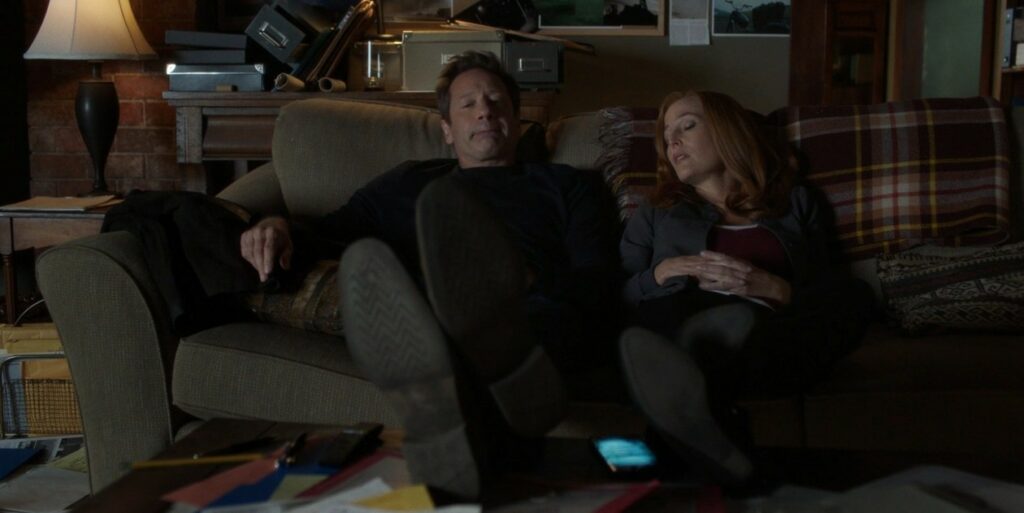
Maybe I’d like the episode more if it was placed elsewhere in the season but following on from the season premiere with another action conspiracy episode that moves at too fast a pace and makes little sense I couldn’t help but reject everything it attempted. The shootout sequences are awful and seeing Mulder and Scully mercilessly gun down soldiers feels so out of character and not the kind of plot The X-Files should be attempting. It feels like any generic action series that has popped up (and then swiftly cancelled) since the original series ended. I don’t buy that Langly ever bought into this immortality scheme (or had a secret girlfriend during previous seasons), and I hate how Skinner is used, once again treated like he might be working for the enemy. Some modern updates, like the titular x-files being digitised and accessed online, are interesting but while it strives to be Black Mirror, the actual mechanics of the plot feel so old and trite.
Best Guest Star: Karin Konoval in Plus One (S11E3)
Plus One is far and away Chris Carter’s best script of the revival seasons. Away from the tortured mythology, he proves he can still deliver a solid standalone episode. He manages it by keeping things pretty simple. There’s no excessive nonsensical plotting and instead focuses on Mulder and Scully, letting the characters breathe, as they investigate the kind of case we’ve seen them tackle many times before. That may have been a negative in past seasons but now it’s a welcome return to terra firma, with some mysterious killings needing to be solved and some nice extended conversations between Mulder and Scully as they discuss getting older and become romantic partners again.
Helping push the episode above the more generic aspects of the plot is a terrific guest performance by Karin Konoval. Or rather performances. She plays twins Judy and Chucky, who in turn have their own internal inter evil twin, so she’s essentially playing four roles – two women and two men, with the help of makeup and fake moustaches. It could come off as too cutesy, too winky, considering Konoval is known for past roles in The X-Files, such as the infamous quadriplegic incestuous mother in Home, but she’s so much fun in the role(s) that it transcends any cheap stunt-casting allegations. It’s a terrific showcase for Konoval, which may be a throwback but also feels fresh, like much of the episode at large.
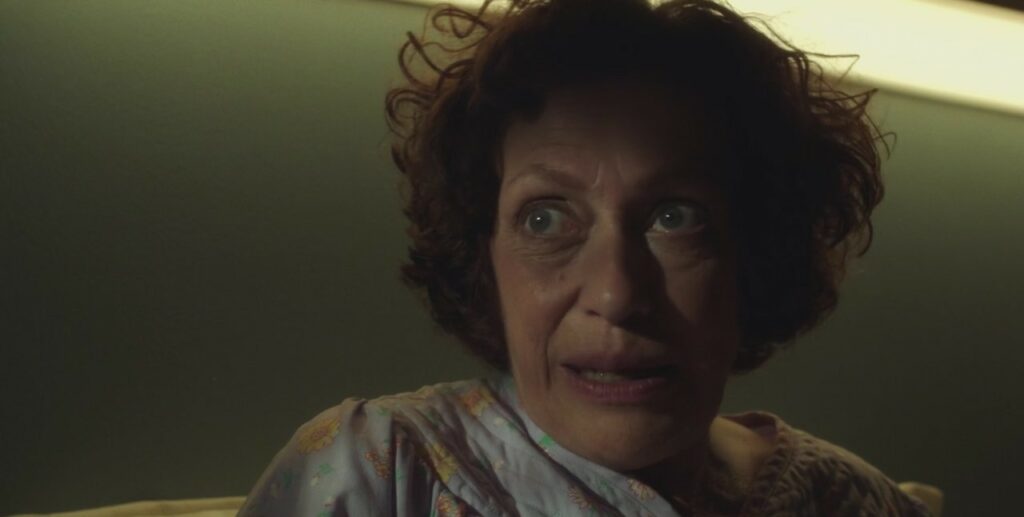
The ‘What the Hell Did I Just Watch?!’ Award: The Lost Art of Forehead Sweat (S11E4)
The Lost Art of Forehead Sweat is the series finale for Darin Morgan’s X-Files, the show within the show, composed of just his episodes. It’s a much better final episode than the final episode we do get. It’s the ultimate Darin Morgan episode, being an incredibly dense, funny script full of meta gags and a storytelling structure of subjective flashbacks. Everything is amped up to 11 and even as a Darin Morgan fan, it may be too Darin Morgan-y even for me. It’s the wildest and broadest episode he’s written and because of the sheer number of jokes, some don’t land for me and it becomes perhaps a little too silly. But even in the few moments I don’t enjoy, I appreciate the episode and Morgan’s singular voice. It’s an episode with something to say and worthy of multiple rewatches, which can’t be said for the rest of the season. And Morgan’s dialogue is always a joy, capturing his specific voices of the characters, even if Scully saying “leprechaun taint” pushes it to the edge.
The world’s gone mad but no one seems to care. It’s The X-Files for the Trump era but can The X-Files survive in such a world? The core tenets of the show, the drive of the characters, is now impossible. How can Mulder search for the truth in a post-truth world? His time has passed. We’re living in a post-conspiracy, post-coverup age. People don’t care if the truth gets out because no one knows what’s real and what’s fake. They don’t know what to believe so people believe what they want to. Does the episode break the show or simply point out how it’s already broken? A man called Reggie claims to have been a third member of the x-files team all along, funnily inserted into past episodes, while a strange Dr. They can control the Mandela effect, affecting collective memory. Is this true or the ramblings of mad men? The episode claims we can’t know, that it doesn’t matter, that fact is a thing of the past. The episode might ‘jump the shark’ but perhaps that’s for the betterment of the show: perhaps Morgan understands the only thing The X-Files has left is the ability to mock itself.
The episode is relentlessly meta, commenting on the show itself from the perspective of a revival season. It explores how we remember the past differently and how it’s perhaps best to leave things as memories rather than returning to them, leading to disappointment. It’s a nostalgic look at the dangers of nostalgia and the episode’s message can be viewed wholesomely or cynically. Is the hunt for truth still charming in a naïve way or ridiculous that it’s still even being attempted. Were-Monster claimed there was still a point in Mulder’s crusade, in revisiting these characters, in reviving the show, but Forehead Sweat (perhaps because Morgan has watched the lame attempts of the other writers) is much less sure of that fact. Scully decides not to taste the Jello from her youth, she wants to remember how it was, and that’s the beat the episode ends on. Some things are better as a memory in the past than experiencing the disappointment of dredging them up. Darin Morgan clearly loves the sweet irony of suggesting the show isn’t worth reviving in a great episode of the show’s revival.
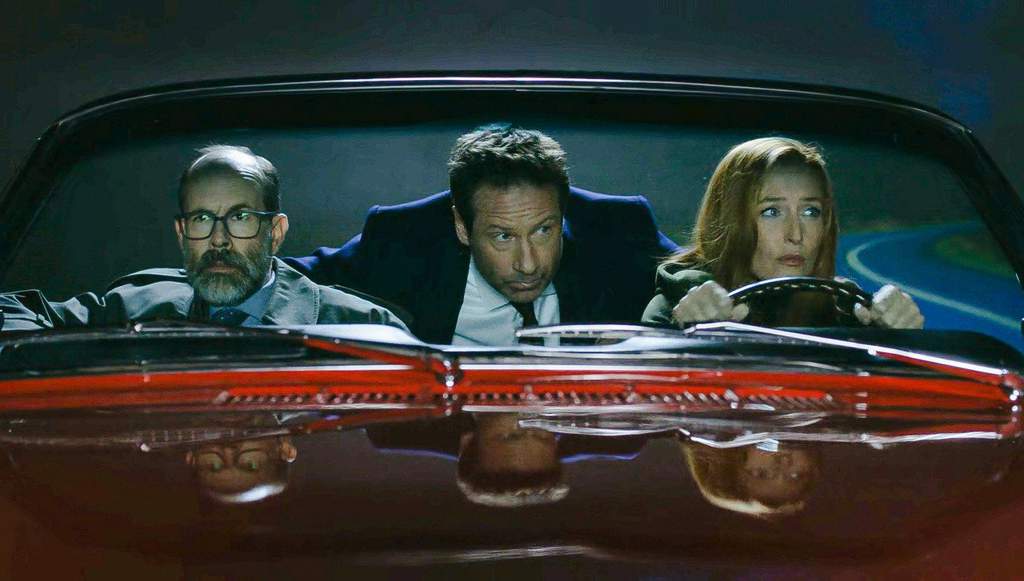
Best Mythology Episode: Ghouli (S11E5)
Ghouli is the surprise of the season, if not the revival. A mythology episode that’s actually good. It’s worth noting that it’s not great, or anything truly special, but it is a solid slice of the continuing story, sandwiched between the terrible My Struggle instalments. How does it accomplish this feat? By not feeling like a mythology episode at all. It begins as a standalone case-of-the-week, with Mulder and Scully investigating two girls involved in a stabbing after seeing each other as a monster. It feels like fertile ground for an X-File, exploring modern teens and the rise of Creepypasta Internet monsters. Even when the episode introduces William and alien hybrids and government conspiracies and all that tired storytelling the core of the episode still has an intriguing standalone mystery at the centre. It’s also well written and directed by James Wong, and features some of the best location work of the season. Yes, like so many episodes it spends too long in a hospital, but the derelict boat location is excellent.
William finally makes his reappearance on the show and, shockingly, he’s actually quite interesting. It’s probably the best direction the writers could have gone with his character, with him neither some messianic Christ child or an evil alien villain. He’s just a teenage boy making mistakes, with a dark streak but also a conscience and heart. He reaches out to his mother, Scully, because he wants that connection, but he also uses his powers in unsettling ways, pitting his two girlfriends against each other in a prank gone wrong. There’s heart to the episode and the relationships, with Gillian Anderson delivering some of her best work of the season, and the touching reunion, navigated cleverly and unexpectedly, is emotional. That’s what makes this mythology story work and the others fail: there’s real character and feeling here rather than nonsensical plotting, which is simplified to focus on what truly matters.
Underrated Episode: Kitten (S11E6)
The revival seasons don’t have the legacy, the decades of discussion, that the original X-Files has, creating a consensus on the best and worst episodes, yet, perusing reviews and sneaking around Reddit, I can still form a sense of which new episodes are liked and disliked enough to name Kitten an underrated, underappreciated episode. No one ever seems to mention it. Yet Kitten is a strong instalment that might not be especially deep but does have some solid thematic ideas around war, the treatment of veterans, and generational trauma, all while being giving valuable insight into the character of Walter Skinner. The simple, fairly generic plot is secondary to some great characterisation, and the action and horror elements are also handled well, with good direction by Carol Banker. It’s an episode that achieves some classic X-Files vibes while still offering something new. It also helps that the Canadian forests were shot in the winter so there’s some real atmosphere, rather than season 10 when filming took place over the summer.
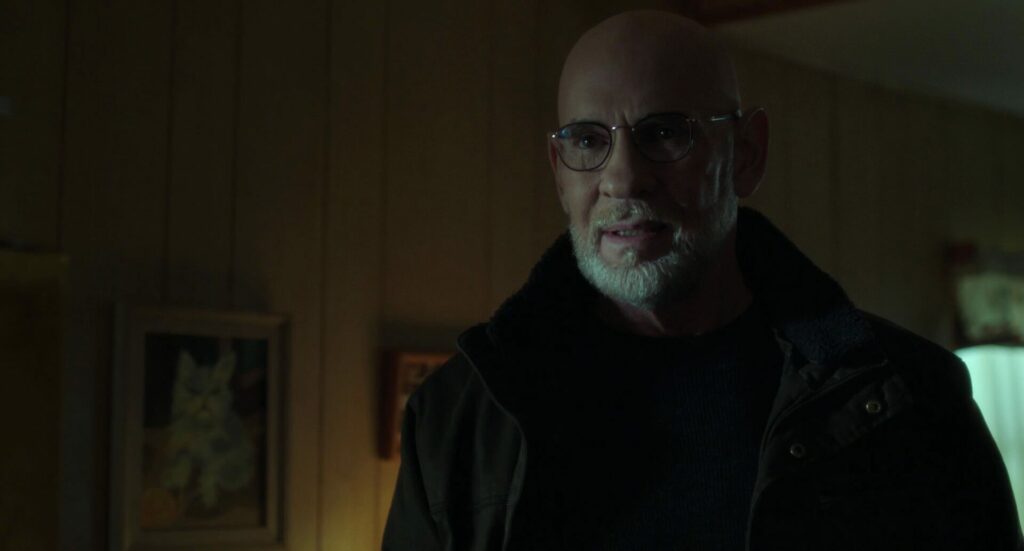
Spawned from a discussion Mitch Pileggi had with Chris Carter where he asked whether his character Skinner is tough to write for because he never gets anything to do, producer Gabe Rotter wrote this script for him as a response. The episode begins at Skinner’s empty apartment, a metaphor for the man who, after 11 seasons, we still barely know, and by the end we have a fuller picture of the man. We see him make up for a past mistake, face the consequences of his actions, and rise literally from a dark pit refreshed. It’s classic storytelling done well. The episode even puts effort into maintaining continuity with the old show, giving us a flashback of a story Skinner told way back in season 2. Kitten feels like the final word on Skinner. For seasons the show has been questioning how trustworthy the character is, which rarely worked as a point of tension for me past season 3, where he became obviously trustworthy, and the episode explores how Skinner is a man of integrity, supporting Mulder and Scully at the detriment of his own career. Finally, the show acknowledges Skinner for the hero he is.
Best Standalone Episode: Rm9sbG93ZXJz (S11E7)
Rm9sbG93ZXJz is a total break from the norm. An episode that could have failed dramatically, and that’s why I like it so much. It takes chances and they pay off. It feels like something new for the series yet just X-Files enough to remain part of the show. The episode features Mulder and Scully in their personal time, eating at a new high-tech restaurant together and when Mulder refuses to tip the AI operating system, the two return to their respective homes being hunted by various types of robots and electronic devices. Yes, killer robots trying to kill the agents because they refused to tip. There’s no hidden twist, no reveal or villain pulling the strings, the set-up is that simple and that silly and it’s great. It’s a funny episode but what makes it truly stand out is that it’s rich in character moments and becomes genuinely disturbing, managing to balance its tones well.
Rm9sbG93ZXJz shows how fresh blood can revive a tired series. It’s penned by new writers to The X-Files. Female writers, too, which is a rarity for the series: Shannon Hamblin and Kristen Cloke. The show desperately needed these new voices rather than just the old returning writers. The episode works because it’s not simply an ‘old man yells at clouds’ situation. It’s not just saying that technology shouldn’t evolve but the massage is that we humans need to be better teachers. It’s our responsibility to see that this speculative sci-fi story doesn’t become a reality. There are robots and drones and 3D printers shooting bullets but the best moments come from the little things, the relatable technological niggles, from pop-ups to not having access to media libraries. As big and silly as it gets, the episode keeps a toe on the line of reality.
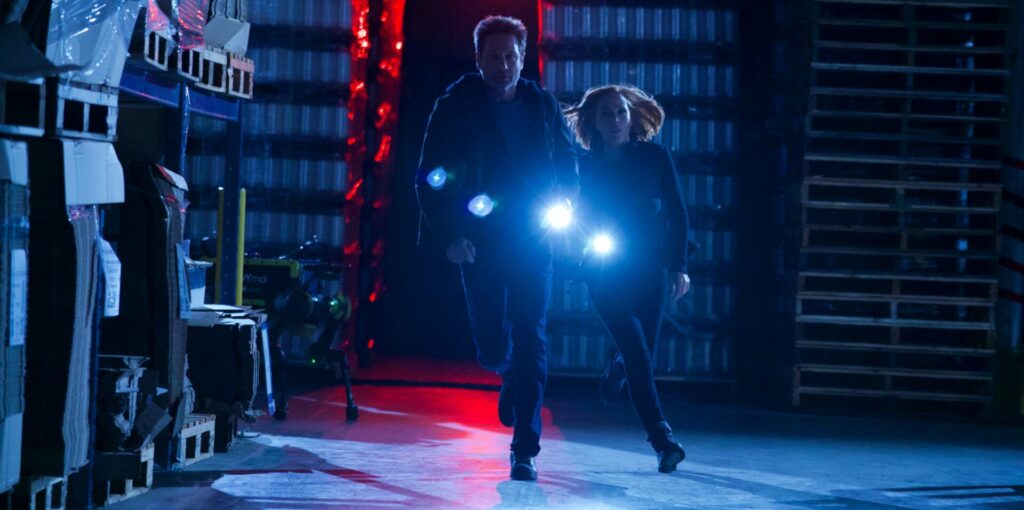
Much of the episode plays out without dialogue, including the entire opening act of Mulder and Scully at a restaurant together, ordering and eating in silence. This shows the impact of technology on people, always on their phone, not truly communicating, but the brilliance of the creative decision is that it also paradoxically shows the humanity of the characters. They get to express themselves and perform in new ways. I think it’s the highlight of Duchovny and Anderson’s work this season, and one of their acting highlights of the entire series. The episode wisely strips away the dialogue, the increasingly poorly written words and Chris Carter’s purple prose of these past two seasons, and lets the actors play, bringing their own personalities to the characters. Scully laughs! Duchovny and Anderson are allowed to just do their thing, and it’s wonderful.
Best Monster: Familiar (S11E8)
Familiar does indeed feel a little too familiar. It’s a decent episode, at least until the weak conclusion, and follows the standalone monster-of-the-week story beats closely, being reminiscent of a few different episodes of the early seasons. Thankfully, one element stands out: the monster itself. The ‘hellhound’ takes several different forms in the episode but none as creepy as Mr. Chuckleteeth. It’s a really great design, based on the very real and very unsettling Mr. Noseybonk from classic British TV show Jigsaw. A character designed to be fun and innocent, a kids’ TV character, yet is unwittingly the stuff of nightmares, like when you see behind-the-scenes shots of the Teletubbies and witness how disconcertingly large they are. Chuckleteeth nails that design challenge, and it looks like it should be a small wooden puppet so when it moves in a gangly way, the size of a man, it’s very disturbing. Mr. Chuckleteeth is certainly one of the standout villains of the latter seasons of the show and speaks to how the episode is unafraid to go to some dark places, killing multiple children in a Pennywise-like fashion.
Biggest Disappointment: Nothing Lasts Forever (S11E9)
When I heard Nothing Lasts Forever was the goriest episode of The X-Files I was excited. I’m not squeamish and I like when the show commits to horror. Unfortunately, there’s little backing up the episode’s bloody excesses. Fitting for a show about beauty and aging, Nothing Lasts Forever is frustratingly skin deep for much of its runtime. I’m all for when the show experiments with tone but this episode settles on the gory yet campy feel of American Horror Story, a show I strongly dislike because it mistakes dumbness for silliness. Much of the episode falls into stupidity, from Scully falling a great height that would clearly kill her yet Mulder barely reacting as if he knows she’s landed in some very soft garbage, to some poor dialogue, with Mulder unironically saying “Well, I checked the dark web…” when trying to track down a missing organ.
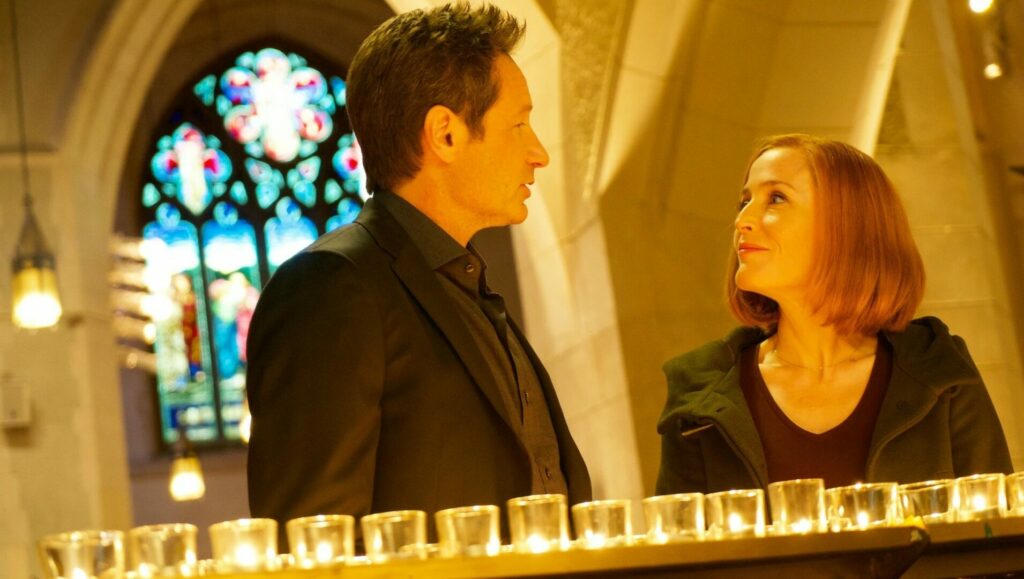
Nothing Lasts Forever is a strange animal. Ultimately, I don’t think it’s very good but there is some potential there, some ideas worth exploring, behind the musical numbers and cannibalism. The villains are trying to avoid aging, managing to reverse the effects and appear young by consuming flesh, and that parallels nicely with Mulder and Scully getting older, looking at their lives and wondering what the next step will be, which is a good question for the penultimate episode to tackle. But outside of the surprisingly strong final scene, the aging discussion is composed mainly of a recurring joke of Mulder needing glasses and hidden behind a needlessly convoluted villain plot. Why can they eat some people but have to be surgically attached to others?
It’s an episode which feels like there’s simultaneously too much going on and not enough, too many ideas and too few. There’s an avenging character treated like a superhero, perching on rooftops and murdering people with parts of a church, and a whole religious subplot which never truly thematically connects to the rest of the episode. It’s a mess. Nothing Lasts Forever is an exasperating watch, having so many potentially interesting elements that never fit together or amount to much, with time instead spent on the dumber aspects.
The End: My Struggle IV (S11E10)
Of all the episodes over the years written as possible series finales, why did it have to be this one the show definitively concludes with? My Struggle IV continues the story and struggles of the revival’s other mythology episodes and yet, dare I say, is an improvement over parts II and III. It’s still structured poorly, with action playing out non-linearly for no apparent reason, featuring a flashback in a flashback in a flashback, but, to give Chris Carter a modicum of credit, the episode is at least comprehensible. I know what’s happening, even if the why remains a mystery. As just another mythology episode it would be poor but easily dismissible, an average instalment, but as an ending to the series it’s a big disappointment.
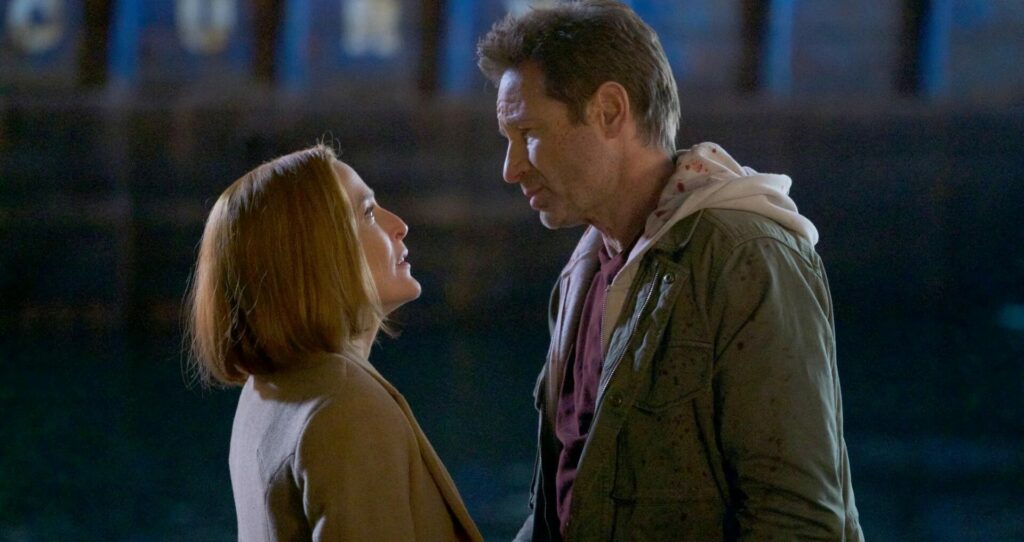
William is the surprise star of the episode, the protagonist, which is an incredibly strange decision for the series finale. Mulder and Scully are backgrounded in the final episode of their show. Scully does nothing throughout the episode, speaking to people on the phone, pacing in Mulder’s home, while Mulder is off investigating. Why split them up? This is our last time seeing them together and yet they barely are together, sharing two short scenes. William is a less nuanced character here than his introductory episode, Ghouli, and is kind of an idiot, making poor choices for little reason. Yet the episode commits to him being the focus right up until the ending where it’s revealed nobody really cares about him. So why should we? 17 years of emotional investment in her son, the last three seasons of the show, evaporates in a few seconds when Scully claims she was never William’s mother. She completely changes her mind after one conversation, deciding William was nothing but an experiment she was forced to give birth to, and she doesn’t care when he’s shot in the head. It’s terrible and makes the entire storyline a waste of time.
The X-Files needs a quiet, intelligent ending. Something like the final scene of the penultimate episode. Instead, the ending is loud and immeasurably dumb. It’s another action episode with chases and people exploding and Mulder gunning down a whole building of bad guys. He murders six people in one scene. It’s so out of character. And then the final episode redoes a bunch of story beats the show has already exhausted previously. The x-files are shut down, again, with little weight behind the moment. Mulder and Scully release the truth through Ted O’Malley, like they did in the season 10 premiere, but little comes of it. Them exposing the world to the truth should be a landmark moment but it’s treated with little more than a shrug. The virus plot is given lip service but backgrounded and left an unresolved possible threat for the future.
Skinner kills Reyes like he did Krycek but the scene doesn’t play at all because we like Monica and still have no idea why she’s a villain now, making it anything but cathartic. Skinner is run over, but is he really dead? William is killed, but is he really dead? The Cigerrete-Smoking Man is shot five times but that means nothing considering we saw his face melt to the bone and skull explode two seasons ago. And then the biggest, most embarrassing moment of all: it all ends with another Scully pregnancy reveal. Mulder and Scully will be parents, for real this time apparently, but it all feels like a repeat of the season 7 finale, as if the show is admitting maybe that was when the show should have ended all along.
Season 11 Episode Ranking:
10. My Struggle III (S11E1)
9. My Struggle IV (S11E10)
8. This (S11E2)
7. Nothing Lasts Forever (S11E9)
6. Ghouli (S11E5)
5. Familiar (S11E8)
4. Plus One (S11E3)
3. Kitten (S11E6)
2. The Lost Art of Forehead Sweat (S11E4)
1. Rm9sbG93ZXJz (S11E7)
And just like that, it’s over. 218 episodes, two movies, and a season of a spin-off show. This rewatch of The X-Files took me about 18 months to complete and a little longer to write about, with these articles becoming novels somewhere in the process. I began writing them to give me an excuse to watch the show. A reason to spend so long watching an old series I’ve already seen rather than something new. Then it flipped, forcing myself to watch the episodes just to finish this series of articles. The rewatch has cemented that I love the show and I never want to do this again. The X-Files will always be a ‘watch a random episode every now and again’ show rather than needing a full rewatch. The peak of the series is exceptional, seasons 2 through 5, and then there are highlights in all the other seasons but some tremendous lows, too, especially when the mythology implodes during season 6. But it’s done. It’s over. I can watch other things again. Like, say, Chris Carter’s other nineties supernatural procedural, with ties to The X-Files, Millennium…




